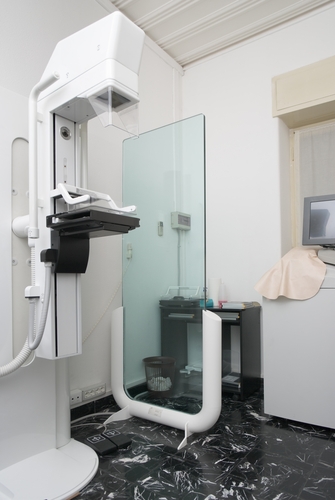In October the American Cancer Society released more relaxed breast cancer screening guidelines, a major policy change prompted by new research that questions the effectiveness of mammography for women 40 and younger.
The updated recommendations advise women with an average risk for breast cancer to begin annual mammograms at 45, continue until they reached 54 and then cut back to biennial exams. Previously, the organization suggested women begin annual screenings when they turn 40 and continue once a year indefinitely.
The ACS published a study along with the new guidelines that claims mammography has little effect on the breast cancer mortality rate for women under 45. It also revealed high false positive rates in younger mammogram recipients. These false positives, the study concluded, could inflict emotional harm on women.
"Though the evidence shows that there are some benefits from mammography screening starting at age 40, those benefits more clearly outweigh the harms from age 45 onward," Dr. Elizabeth Fontham, Dean of the School of Public Health at Louisiana State University and chair of the panel that oversaw the development of the new ACS guidelines, said during an interview with NBC News.
Studies Cast Doubts On Mammography
In February 2014 The British Medical Journal published an extensive study on the effectiveness of mammography, reported The New York Times. The study, which involved 90,000 women aged 40 to 59 and took 25 years to complete, found that the breast cancer mortality rate was the same for women who underwent screening and those who chose to forgo the mammogram. It also found that 1 in 424 women who received mammograms were subjected to unneeded cancer treatment.
"It will make women uncomfortable, and they should be uncomfortable," Dr. Russell Harris, professor of medicine at University of North Carolina, Chapel Hill, said during an interview with The Times. "The decision to have a mammogram should not be a slam dunk."
Radiological organizations immediately attacked the study. The American College of Radiology, in a press release, deemed it "incredibly flawed and misleading."
"This is further follow-up of a flawed study," Dr. Larry Norton, deputy physician-in-chief for Breast Cancer Programs at Memorial Sloan Kettering Cancer Center, told Breastcancer.org. "There are no new data here, so it should not influence any changes in screening recommendations."
Later in 2014, The Journal of the American Medical Association published a Harvard study that claimed the benefits of mammograms were overblown, reported National Public Radio. The study, which was conducted over a period of 50 years, found that annual mammograms did little to prevent fatal cancer in women in their 40s. The researchers postulated that approximately one woman would die per 1,904 women screened. The study also found that 19 percent of women diagnosed with breast cancer via a mammogram were overdiagnosed.
Around the time these studies were released, the ACS was re-evaluating mammography's place in breast cancer prevention. ACS Chief of Cancer Control Dr. Richard Wender told The Times he doubted the validity of the British Medical Journal study, but said he and the ACS guideline panel were taking all scholarly research into consideration.
ACS Straddles The Line
Despite its new guidelines, the ACS continues to assert that mammograms are still essential to breast cancer prevention. "The most important thing about our new guidelines is to validate that screening mammography is the most effective thing a woman can do to reduce her chances of dying of breast cancer," Wender said in an interview with NBC News.
Wender argued that while the new screening recommendations did reflect the medical community's changing attitude toward the mammogram, they were equally impacted by his organization's desire to offer women more personalized preventive care.
"This is a far more tailored guideline than has ever been published before for breast cancer," Wender told NPR.
Ronny Bachrach
Latest posts by Ronny Bachrach (see all)
- Konica Minolta Debuts First-of-Its-Kind Digital U-Arm System at AHRA - July 27, 2016
- Researchers Detect Signs Of Stroke Risk Using MRI - June 27, 2016
- Imaging Biz: Q&A with David S. Channin MD: How to Make PACS Patient Centered - June 22, 2016










